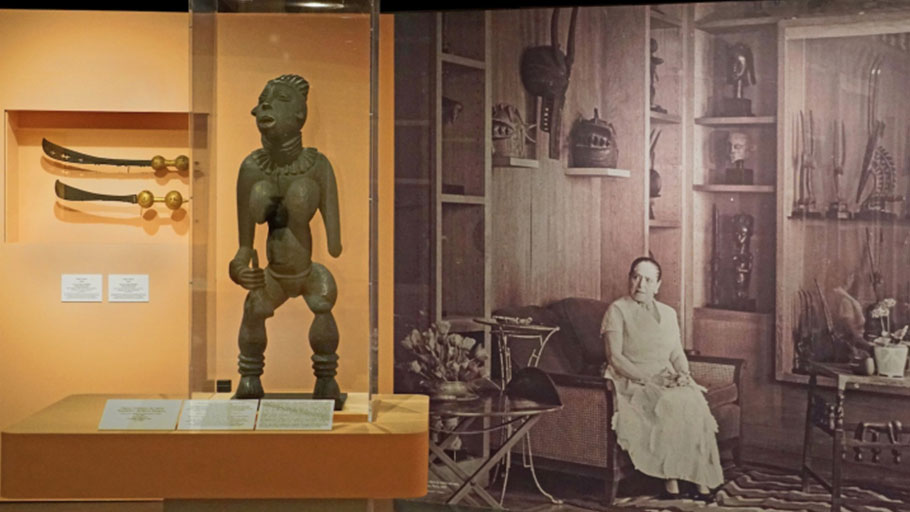In the wake of initiatives to repatriate Africa’s stolen property, the author of this letter asks the French President to repair what his ancestors have broken, before attempting to restore the war trophies of colonial conquest.
By Manthia Diawara, Hyperallergic —
“All of the elements for a solution to the major problems of humanity existed at one time or another in European thought. But the Europeans did not act on the mission designated them.” – Frantz Fanon, The Wretched of the Earth
Mr. President, I ask you to repair what you and your ancestors have broken in my home, before you restore the war trophies of colonial conquest. These days, restitution of so-called “African patrimony” exhausts me, because it is yet another ruse the West has devised in order to distract Africans from the real problems facing them. Maybe for you restitution is a noble gesture that sets you apart from your predecessors. But for me, Mr. President, restitution must come after reparations for the still ongoing pillage and despoliation by Europe and other foreign powers of Africa’s material and natural resources. The neoliberalism that today gives great pleasure to inhabitants of the United States and Europeans continues to impoverish Africans, and drives them to emigration and religious fundamentalism. And no one in these strongholds of human rights raise their eyes from their coffee cups to notice and tremble along with those who shudder at the rage of the Mediterranean Sea.
Mr. President, I am writing to tell you that your apparently magnanimous gesture of returning African “art” objects to Africa somewhat resembles the daily expulsion of Africans from your country. It was Europe that first accosted Africa in search of opportunities to develop and enrich itself. In return for its “noble” civilizing mission, Europe desired ivory, coffee, oil, uranium, coltan, and other resources to which it gave and continues to give itself access as if these resources belonged to Europe. Where would French and European market competitiveness be if companies like Total, Areva, Bouygues, Bolloré, Suez, Eiffage, and others had not plundered African resources? Have Europeans forgotten the initial goal of their Christian mission in Africa in order to shut themselves off in egoistic profit, and isolate themselves like Donald Trump’s United States, without conscience or memory?
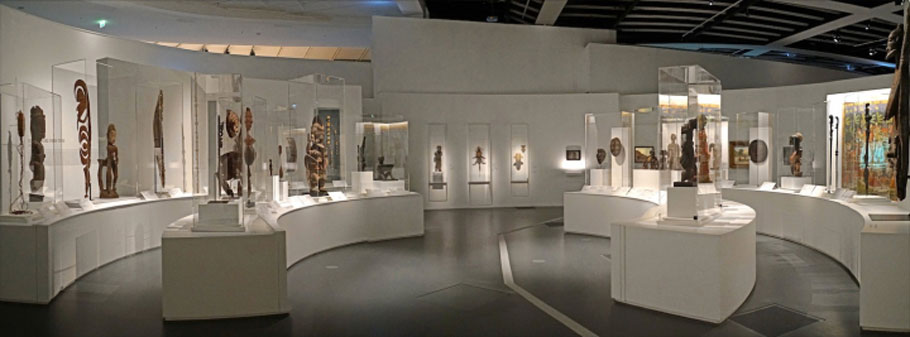
The photographer describes this is a “room of masterpieces acquired over 20 years” displayed at the Quai Branly Museum (photo courtesy Jean-Pierre Dalbéra via Flickr).
Mr. President, it’s a good thing that you are not known to be implicated in the shady maneuvers of France-Afrique as were your predecessors, Presidents Mitterand and Chirac. You also have the reputation of being more pragmatic, more focused on economic problems and their political consequences than on cultural and artistic matters. This reputation leads me to carefully consider your recent decision to return “art” objects of African origin to Africa.
Could it be, Mr. President, this strategic, problem-solving mindset has led you to select a committee of experts in everything other than African art in order to make a hasty decision to restore these objects to an uncertain future? In any case, your political calculation immediately caught on. Doubtless there are those who appreciate your gesture as a sign of magnanimity and reconcilation. African politicians, nimble critics of the France-Afrique that keeps them fed, won’t forget you either for giving them a leg up for their victory over colonialism. And there are also intellectuals who already see in this a rectification of history, even a decolonial victory.
But as for me, I accuse! Following Walter Benjamin in his Theses on the Philosophy of History, let us recall that all war trophies belong to the conquerors. Thus, these once sacred objects known today as “traditional African Arts” are quite simply trophies of the conquests and colonizations of Africa by Europe. Indeed, it was Europeans who were first responsible for defining them as art works worthy of being displayed in museums; it was Europeans who first bestowed on them, as Pierre Bourdieu would say, a market value and value as symbolic capital within Western museums.
On the other hand, Africans feared the secret power of these objects which were desacralized and blasphemed when exhibited in public to people who were not initiated in the rituals and rites that gave them their original meaning. I still remember what my aunt said when I was a boy in my uncles’ village in the Kharta (Republic of Mali): “Come back quickly and go to bed, before they take the Komo out. If not, if you see it, you’ll get so fat that you won’t be able to fit in the doorway so you can hide.”
The philosophical, artistic, and practical questions posed today by specialists from every continent concern where these objects will go and under what conditions. Will they be restored to the Dogon, the Bambara, or the Baoulés as sacred objects, to be protected against vandalism, profanation, and the intolerance of monotheistic fundamentalists? Or, Mr. President, will you build museums to shelter them in Africa? Might you also have thought of a partnership through which the works would be the common property of the Parisian Quai Branly Museum and African museums? Here we are, firmly ensconced in France-Afrique!
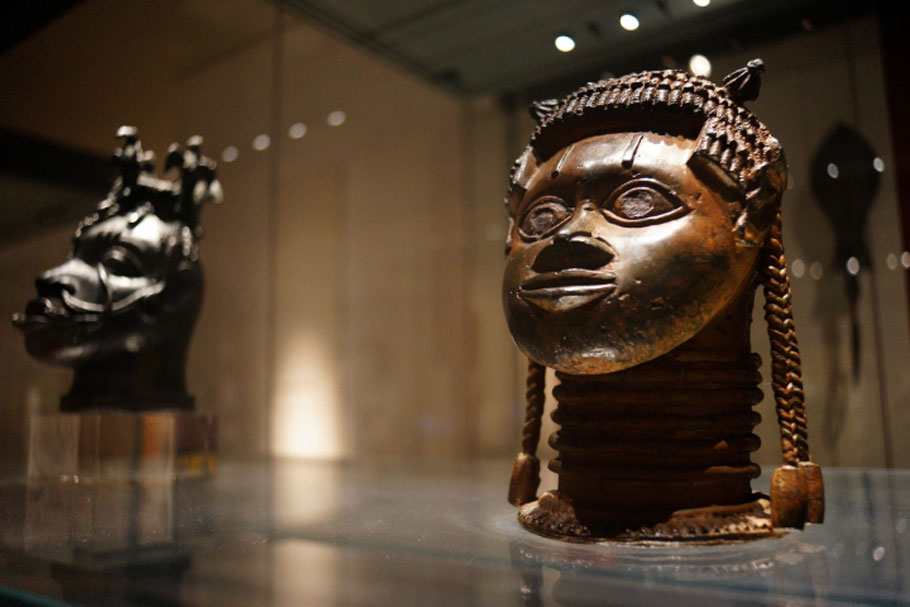
Unidentified object, likely of African origin, displayed at the British Museum in London (photo by Paul Hudson via Flickr).
But, Mr. President, as Sembene Ousmane said about Négritude, restitution does not feed anyone in deep Africa, nor does it reconcile continents and races, nor does it put an end to the emigration of Africans to the West (which is in part generated by the theft of Africa’s natural resources over the past four centuries) How much of Africa is there in Europeans’ and Americans’ daily consumption?
It is in this sense, I think, Mr. President, that these objects of the traditional arts of Africa are as European as they are African — I emphasize this only to remind visitors to Western museums what Europe stole from Africa.
We prefer reparations to restitution now.
Mr. President, we cannot continue to shut our eyes, minds, hearts to the disgusting poverty in Africa. No longer can we ignore the link between the miseries of some and the well-being of others, Africans on one side and Europeans on the other, natural resources looted from here and transformed there and then sold back in the form of fetishes to their true owners.
If you permit me, Mr. President, a crude metaphor, I would tell you that Africa has had its legs amputated by many factors for which Europe is chiefly responsible: the long transatlantic slave trade; colonial conquest followed by the infamous Berlin Conference which ripped Africa apart in order to give Europeans pieces of the continent; both world wars; the imposition of stillborn nation-states, and, finally, terrorism, which has now transformed Africa into a proxy battleground between the West and its enemies.
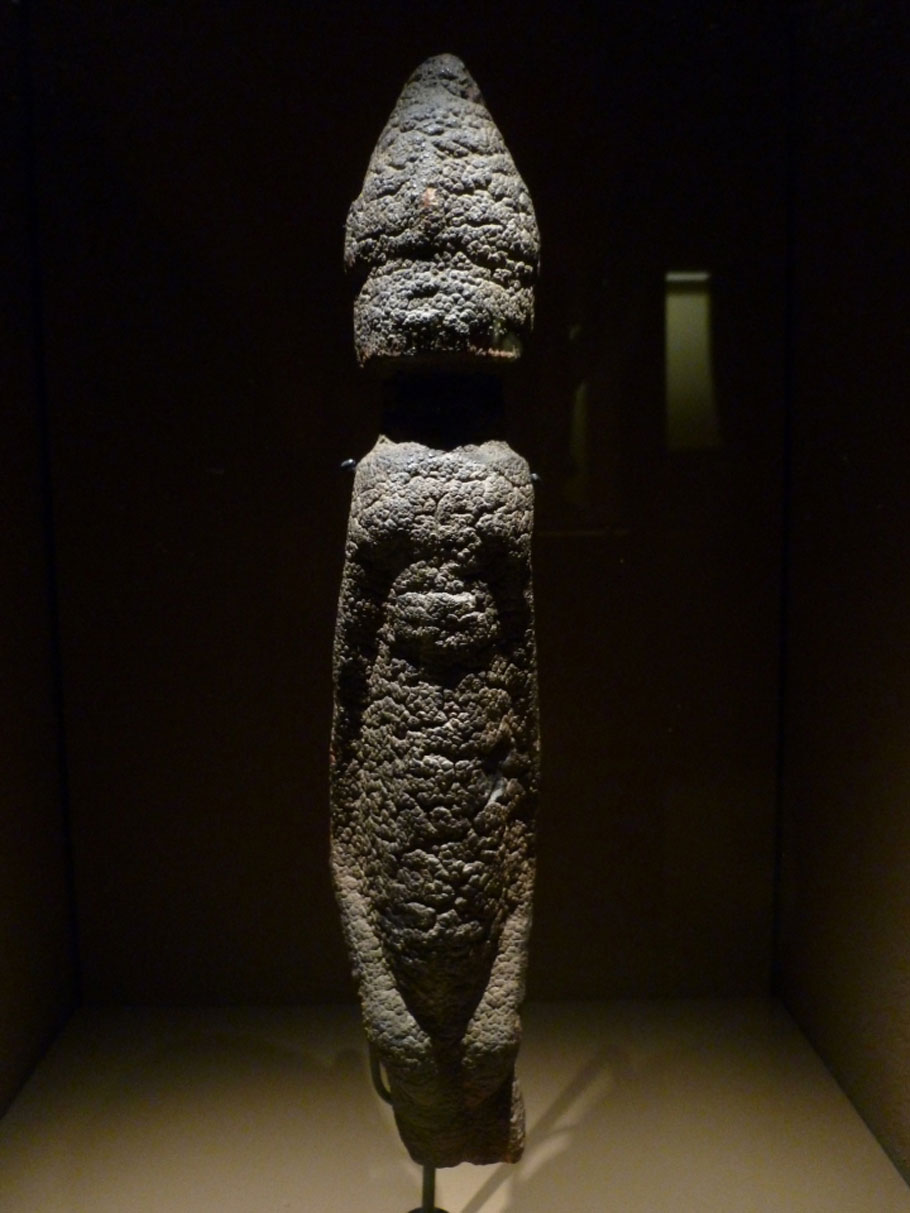
Unidentified object, likely of African origin, displayed at the Quai Branly museum in Paris (photo by Monika via Flickr).
It is said in the West that Africa must be helped, that there must be solidarity with Africa, that there must be love for Africa. All technologically advanced countries, including Russia and China, have plans to help train Africans, plans to help develop Africa. The World Bank along with the International Monetary Fund never stop coming to the aid of African states with loans they will never be able to repay. Bill Gates and many other philanthropists and non-governmental organizations hitch themselves to dubious humanitarian projects, allegedly to help Africa. One could even win the Nobel Prize by getting attention in studies of development or health in Africa. It makes one wonder what these enterprises would do without African poverty?
On the other hand, after raping, humiliating, and belittling Africa for centuries, the West has found specialists to say that nothing more can be done for it, because their peoples are corrupt, or as those Africans who have ended up internalizing the racist stereotype of their inferiority say: development and progress are “white people’s things.”
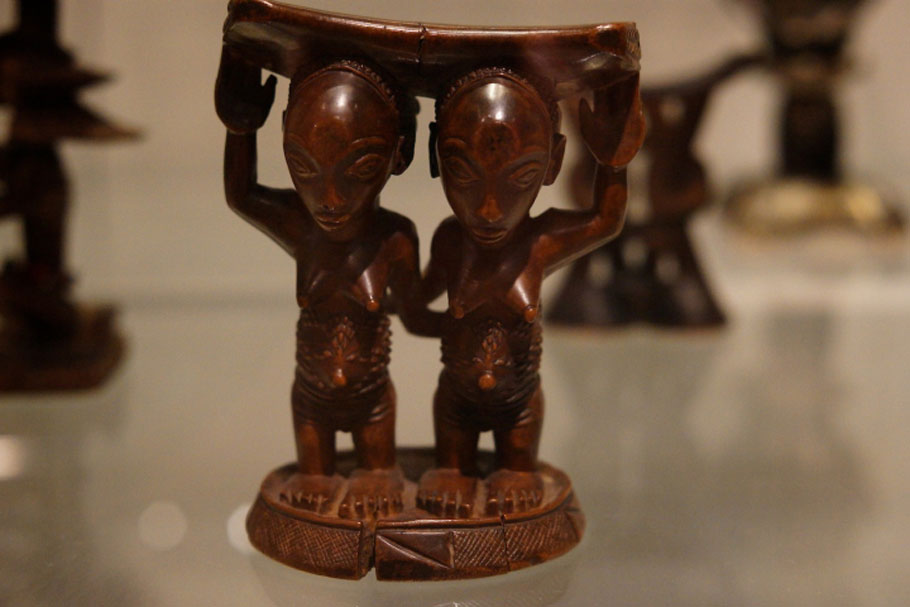
Unidentified object, likely of African origin, displayed at the British Museum in London (photo by Paul Hudson via Flickr).
Africa is being robbed in plain sight of the entire world, and every day it is continually told, even by African intellectuals, that everything has been done for it and that the world is tired of supporting it like a child who refuses to grow up and take on responsibilities. But, Mr. President, all honest people know that the capitalist countries cannot just turn off the tap and leave Africa to itself! They cannot stop “aiding” (or rather burdening) Africa with debt; otherwise, Africans would awaken and say they are fed up with feeding a one-sided, capitalist system with their sweat and their natural resources!
Mr. President, we also prefer reparations before any restitution, just as France, Germany, Japan, and Israel, have all benefited from reparations before considering the restitution of their patrimonial objects. Recall that following World War II, the United States with its Marshall Plan poured billions of dollars into several European and Asian countries in order to enable them to get back on their feet, after the destruction of their economies and democracies?
As you know, Mr. President, the US was afraid that European (and other) nations decimated by war would become the easy prey of Communist ideology. This makes it clear that the Marshall Plan, and the reparations it included, far from constituting charity, was installed in the interests of an America which had proclaimed itself the defender of democracy and the sworn enemy of Communism.
The amputations of African agency committed by Europe in the name of so-called civilization must also be repaired. We propose, without any irony, to christen these reparations the Macron Plan.
But, Mr. President, unlike the American Marshall Plan, this will not be a matter of paying according to the number of inhabitants on the continent, nor of swelling the coffers of every African nation state without exception. In the absence of a global African project, such programs would only get mixed up in transcontinental corruption and prolong Africans’ indebtedness and infantilization. We demand a proper and comprehensive reparations plan to put an end to anemic and anachronistic nation-states in this modern world. It is evident that up until now these nation-states have only profited foreign entrepreneurs and the African leaders who have chosen to serve them. We also demand these reparations be regarded as the responsibility of Western taxpayers, in whose name we are continually annihilated by the existing economic system and its institutions blocking our entry into modern history.
Under the auspices of the Macron Plan, Africa demands neither charity, paternalism, nor band-aids. In order to revive Africa, Mr. President, what is needed is a real program of economic development, accompanied by the installation of democratic institutions supervised by a committee made up of Africans and Westerners for a specific length of time.
We are convinced that this plan, instead of encouraging the separation of different African ethnic groups by machete blows, will bring us together to free up creative energies wherever they may be found. Instead of sending us soldiers to fight terrorists and fundamentalists who, as we have seen with the downfall of Muammar Qaddafi and Saddam Hussein, are the results of your wars for oil and uranium, the Macron Plan for Reparations alone, Mr. President, is able to reconcile Africa with itself, but also with the West.
As Édouard Glissant said, terrorism cannot be fought with terrorism without risking the annihilation of human culture and society. Terrorism cannot be brought to an end without reparations, the imaginary, and poetry. Instead of hurling Africans daily into the Mediterranean Sea, pay us with reparations, for the majority of African emigrants to the West would go back to African countries if they had the same work opportunities, cross-border mobility, and human rights that Europe theoretically offers today.
We prefer reparations to restitution so that bridges can be built between nations and cultures, in order to liberate creative energies. We demand reparations in order to remove the suffocating barriers that Europe has constructed between Mali, Senegal, Ivory Coast, and Guinea. We also want material goods and knowledge to travel freely from country to country. Too long has the West ignored its debt to Africa, because the problem has always been discussed with nation-states — which are endowed with a sovereignty that ultimately divides and weakens them and which profits Western entrepreneurs more than African peoples — rather than with regions or the entire continent speaking with a single voice.
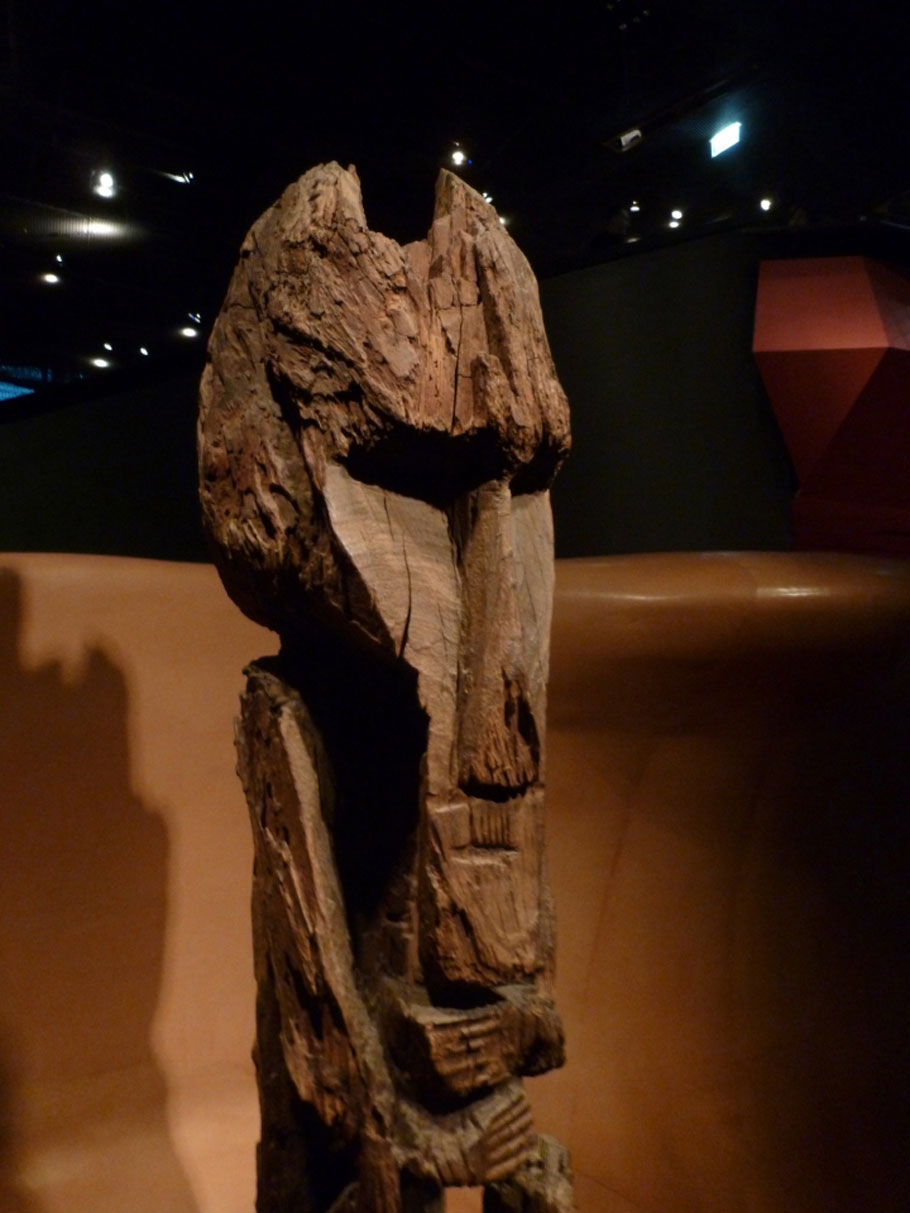
Unidentified object, likely of African origin, displayed at the Quai Branly Museum in Paris (photo by Monika via Flickr).
What we understand by reparations begins with the demand for economic, moral, and democratic justice, for an Africa oriented toward the future instead of a perpetual quest for an inaccessible past. To begin with, we demand the establishment of a committee of African and Western experts in economics, political science, and sociology, which would estimate the monetary value of at least three regions of the African continent: West Africa, Central Africa, and East Africa. (These experts would also decide on the way in which the Maghreb, Egypt, and South Africa should be repaired.)
The Macron Plan will be financed by European and American taxpayers, who are the first to benefit from Africa’s natural resources, but also the first to vote against the immigration of Black people to their countries. If it is true that France annually spends nearly 500 billion euros for the maintenance of French people’s social security, why not contribute in one payment 500 billion euros, in the form of reparations, towards the development of democratic and economic institutions from Senegal to the Ivory Coast. And, Mr. President, we say that what goes for the Macron Plan applies equally to the United States, Germany, the United Kingdom, Japan, and other countries who have deliberately enriched themselves at the expense of our underdeveloped countries.
Mr. President, permit me to conclude by saying that only reparations will enable the beginning of a reconciliation between continents, races, and cultures, which restitution cannot accomplish. The effects would also be automatic in the West, where a decline in immigration and terrorism would take place. We will also see the emergence of a new creativity because the differences of ethnicity and nationality will be reassembled for the creation of a new Africa. Such could be the Macron Plan’s initiative, more promising than restitution, and the bearer of liberatory energies and honest human relations between Africa and the West.
This article was originally published by Hyperallergic.
Editor’s Note: This piece was translated by Christopher Winks and originally published in French on the Mediapart website, December 16, 2019. The author also wishes to thank Salah Hassan for facilitating the translation of the original essay.
Featured image: An exhibition of the collection of Helena Rubinstein at the Quai Branly Museum in Paris (photo courtesy Jean-Pierre Dalbéra via Flickr).

